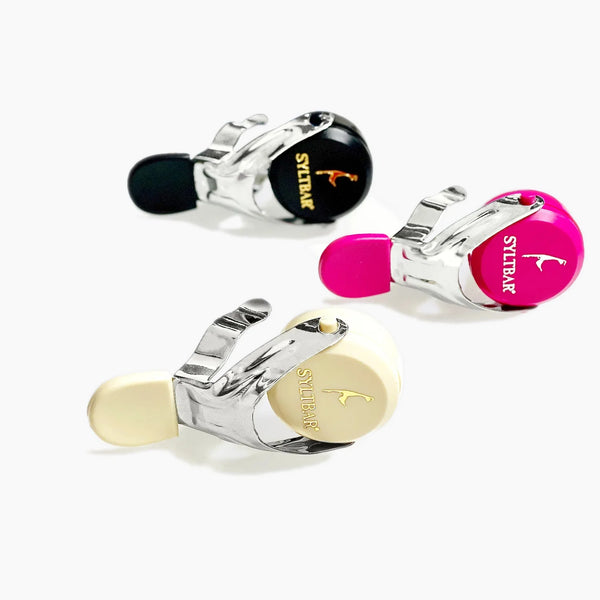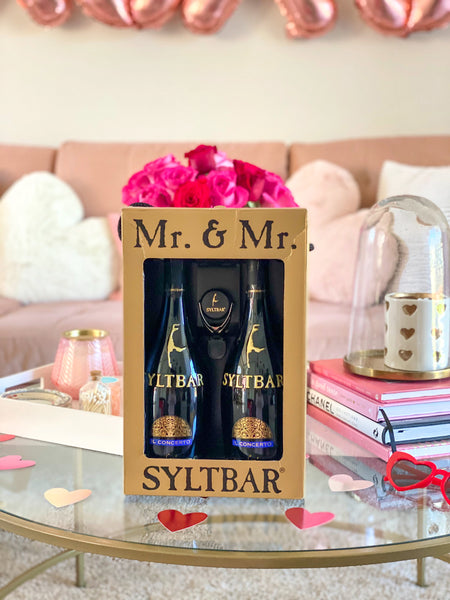SYLTBAR is celebrating life’s everyday moments with the finest in Italian craftsmanship and quality — and that means paying extra attention to the smallest of details. Let’s dive into a topic that comes up often when we are talking about the Brut Prosecco and Champagne – the concept of splits in Champagne and Prosecco. We are asked all the time: Why don’t you sell Mr and Mrs in a split?
A split is essentially a mini bottle of sparkling wine. It is typically about a quarter of the size of a traditional 750mL bottle. These bottles are considered individual or single servings, even though they contain more than a standard 5 oz. glass of wine, which makes them a popular choice for consumers who like a “good deal” on their bubbly.
Our producers have made this very deliberate choice, which allows them to focus on delivering their customers a consistent and quality Premium Brut Prosecco. Over the last 60 years, our winery, San Simone, has found that the aging process is much faster in split bottles and that much more sulfites are required to bring these splits to the market. In order to preserve the integrity of their winery history, which was founded in 1915, you will never see Mr Premium Brut Prosecco or Mrs Sparkling Rosé sold in a split.
Most restaurant Food and Beverage Managers prefer offering splits because they see it as eliminating waste by only selling one glass. It is much more convenient for them, and especially in country clubs or places where sparkling wine isn’t sold as much. This is the perfect solution; it’s margin-driven, but not quality-driven.

While these petite bottles may seem appealing for their convenience and sometimes money-saving aspect, there are only downsides and disadvantages for the end-consumer when using splits.
Our producers — and us as the brand owners — have a strong ethic when it comes to purity. Just to be present in the split market would cut down on our natural production practices, so we have decided against offering them. This is because we want to give only the best to human beings.Health is first priority for all of us, so we care about what people put in their bodies.
Disadvantages of Brut Prosecco and Champagne Splits
Limited Aging Potential
One of the key drawbacks of splits is that they often have a shorter aging potential compared to their standard-sized counterparts. The reduced volume accelerates the aging process, potentially affecting the wine's flavor profile and overall quality.
The aging process is much faster in little bottles, and that means more sulfites are needed to make sure the wine does not spoil in a short amount of time. Of course, when a wine is not 100% naturally produced from the beginning, the chemicals and sulfites don’t make too much of a difference in little bottles.
In our case, due to the purity of the harvest, it will never require chemicals, added sulfites or Roundups. All of these additives can be avoided in the 750ml bottle. Why should we start to produce in splits just to satisfy the buyer who doesn’t understand what goes on behind the scenes? On top of all this, the natural sugar content in smaller bottles changes much faster, which results in a different flavor profile and more calories.
Reduced Prestige
Champagne and Prosecco are often associated with celebrations, luxury, and sophistication. Offering splits may diminish the prestigious image that these exquisite wines hold. SYLTBAR believes in presenting our Premium Brut Prosecco in its most authentic and elegant form, aligning with the tradition and excellence it represents. We aren’t the only brand that feels this way.
Higher end Champagnes like Laurent Perrier, Ruinart, Dom Perignon and Krug do not offer splits either, for the same reason as us. Many of the mass-produced Proseccos and Champagnes have splits available, such as Veuve Clicquot, Moet & Chandon, La Marca, Ruffino and Mionetto, and we do not associate SYLTBAR with these brands.
Inconsistent Quality:
Splits can sometimes suffer from inconsistencies in quality, as the smaller volume can make it challenging to maintain the same level of precision and control during production. We prioritize delivering a consistently exceptional product at SYLTBAR, which is achieved much more through our standard-sized bottles. When it comes to true natural production, there is nothing added or removed.
Choosing Excellence Over Splits
Our commitment to delivering the highest dry-farmed quality Brut Prosecco is at the core of SYLTBAR. By focusing on standard-sized bottles, we can ensure that each bottle undergoes the meticulous craftsmanship and aging process needed to achieve the exceptional taste and character that defines our brand.
We believe in providing our customers with an elevated and memorable experience. Our standard-sized bottles not only maintain the integrity of the wine but also contribute to the overall sense of everyday luxury that defines the SYLTBAR experience — your Happy Healthy Daily Juice.

You can just enjoy a glass, this no need to finish the whole bottle. We offer our signature SYLTBAR stoppers, made in Italy (not in China) that will hold your favorite bubbles fresh up to 3-4 days. This stopper does not weaken after using it thousands of times either. Because of its patent, it is guaranteed to seal the bottle 100% of the time. You can hear the pop immediately after opening, and experience same freshness of Mr our Premium Prosecco or Mrs SYLTBAR our Sparkling Rose, time and time again.
The decision to forego splits is a deliberate choice rooted in our dedication to quality, tradition, and providing an exceptional experience for our customers. We invite you to savor the richness and sophistication of our Brut Prosecco in its truest form, allowing you to create unforgettable moments with every sip. Cheers to excellence!







